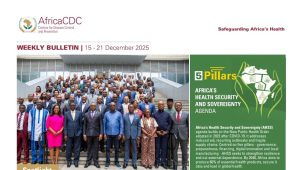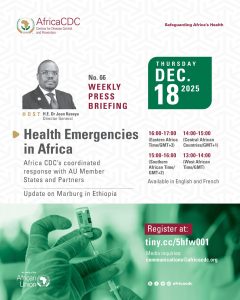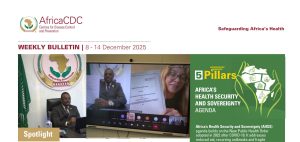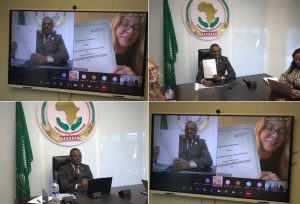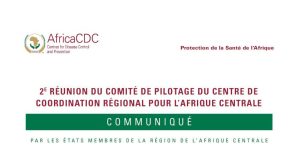The Africa Centres for Disease Control and Prevention and the African Union Commission have developed an accountability framework for the implementation of the Lusaka Agenda and established a secretariat at Africa CDC to coordinate its implementation, a senior official announced during the Countdown to the G20 Summit in South Africa.
“While the Lusaka Agenda is a global agenda, for the AU Member States it represents today one of the crucial pathways to realizing the joint long-term vision of domestically financed primary health care systems as a cornerstone of Universal Health Coverage,” said Dr. Raji Tajudeen, Acting Deputy Director General, Africa CDC, who told the meeting.
The Lusaka Agenda, launched on Universal Health Coverage Day, December 12, 2023, provides a framework for coordinated action towards a unified vision of sustainably and domestically financed health systems and universal access to healthcare. Professor Julio Rakotonirina, Director of Health, Humanitarian Affairs, and Social Development at the AU Commission, said there is need for accountability mechanisms and the integration of the Lusaka Agenda into national health strategies. Given the decline in external health financing, he emphasized the need for alternative funding mechanisms and the efficient utilization of available resources to maximize health outcomes across AU Member States.
In February 2024, the Heads of State and Government of the African Union endorsed the Lusaka Agenda.
“The Lusaka Agenda is not merely another policy framework; it is a call to action to transition from dependency to self-reliance, ensuring health systems in Africa are sustainably financed and people-centered,” said Dr. Tajudeen.
The Lusaka Agenda defines five strategic shifts aiming to advance alignment of external support with one national plan, one budget, and one monitoring framework. It also promotes increased domestic resource allocation to health, the use of national financial systems, fostering coherence, and making a stronger contribution to primary health care to accelerate progress toward UHC.
“The Lusaka Agenda is an agenda of health sovereignty, which places domestic investments into primary healthcare as the cornerstone of health security and calls for transitioning over time out of donor dependency,” said Dr. Tajudeen.
Early in March, Africa CDC and African Union leadership engaged with Ministers of Health to identify the gaps and find solutions to ensure that the health of Africa continues to be protected.
The ministers agreed on the following roadmap, which will reinforce the implementation of the Lusaka Agenda through increased domestic resource mobilization and innovative financing.
“We will conduct a strategic assessment of the health financing gaps with a review of national health financing plans across the continent and propose a menu of health financing solutions to inform collective engagement efforts, including as a framework for engagement at the upcoming World Bank Spring Meetings in April 2025,” said Dr. Tajudeen.
He also said a Ministerial Task Force will be established to work with Africa CDC on the health financing initiative – a group of 10 Ministers will represent the continent at the World Bank Spring Meetings, and a monthly progress conversation meeting of African Union Health Ministers will be held to take stock of how we are progressing.
Some African countries are already moving ahead with the implementation of the Lusaka Agenda based on their country context. These include Central African Republic, DRC, Nigeria, Tanzania, Ethiopia, Ghana, Malawi, Mozambique, Senegal, and South Sudan. “The accountability mechanism of the Lusaka Agenda will leverage the financial monitoring tool established by the Africa Leadership Meeting (ALM) on Investing in Health Declaration,” said Dr. Tajudeen.


